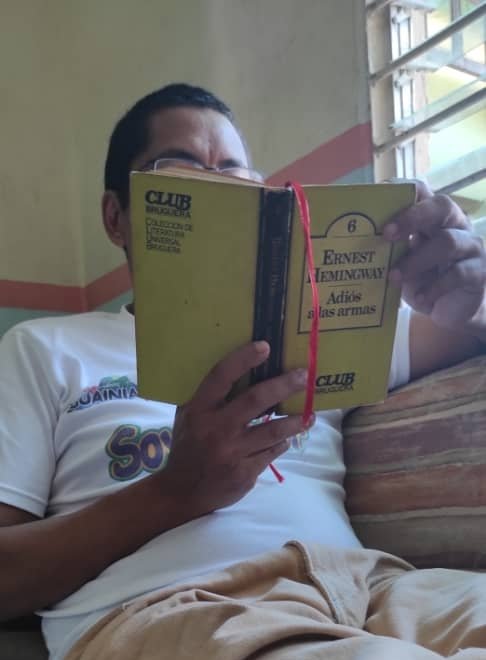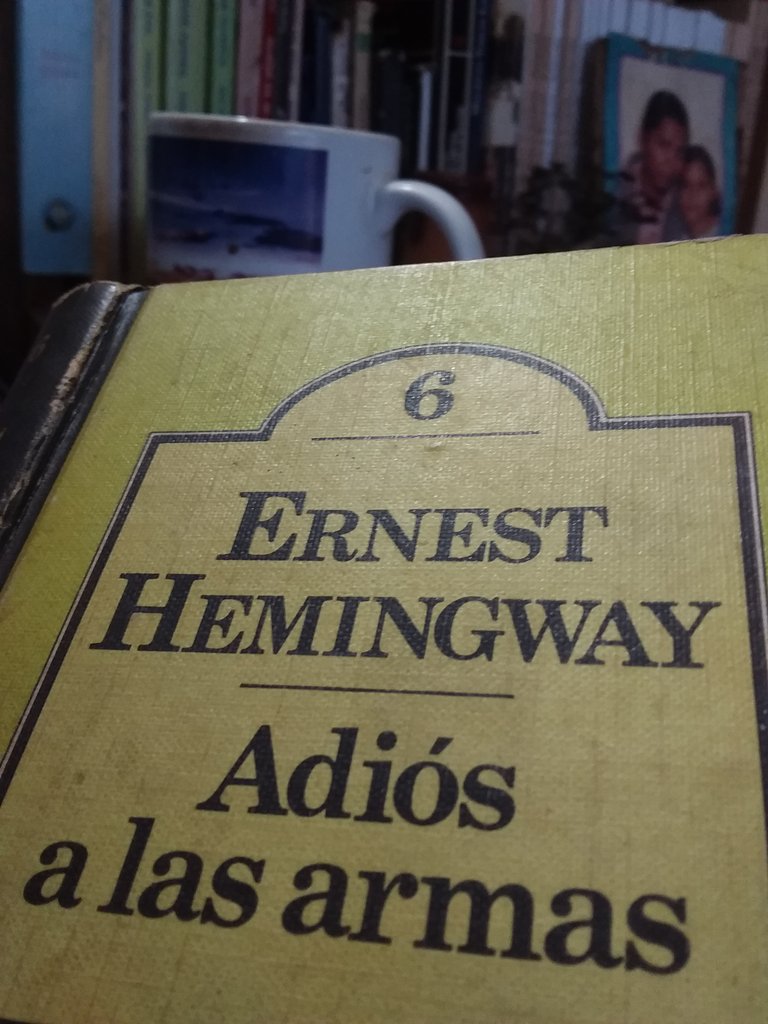

La lectura es para sentirla
He terminado de leer Adiós a las armas, de Hemingway, uno de los 100 títulos que conforman la colección Club Bruguera, de la editorial Bruguera de España, ya desaparecida. Llegué a este libro motivado por la relectura que hice de El viejo y el mar; por ahora dejo pendiente sus otros libros porque no los tengo. Este post no es para reseñar, porque la lectura del libro siempre será más nutritiva que un comentario, una apreciación o un resumen, y a eso los invito.
Si acaso tiene para ustedes algún valor el oficio de leer, nótese que digo OFICIO y que abuso de las mayúsculas y además, lo remarco en negritas, pero para mí, leer es un oficio como cocinar, asear la casa, escribir un relato o dar un discurso. Antes, por ejemplo, creía en lo que dijo el poeta colombiano, Juan Gustavo Cobo Borda: "Leer y escribir es un acto indisociable de una misma persona"; 20 años después considero que no, porque no todo el que lee tiene que ser escritor, es mucho con que existan buenos lectores.
Mi primo Belén se lee cualquier cantidad de libros en un mes; Los miserables llegó a leerlo en menos de una semana, pero él no escribe ni un mensaje de texto porque es un hombre de campo, pero que comparte su oficio de agricultor con el de lector; a ambos da la misma importancia, los asume con la misma seriedad. Mi zapatero, el señor William, intercambiaba libros con otros lectores y les hablaba de libros a sus clientes mientras estos esperaban sus calzados; con ello, mi zapatero compartía dos pasiones; el de ganarse el pan y el de ganarse el respeto del cliente porque quién no iba a querer que se le dañaran los zapatos teniendo un zapatero ilustrado.
Lo otro sí tiene que ser así, es decir, todo escritor debe ser un lector, incluso más lector que escritor, pero no es de la escritura que quiero hablar, sino de la lectura. Estoy convencido de que llega un momento en que esta debe comenzar a practicarse por espontaneidad; que si esto sucede puede hacerse con mayor frecuencia; que si adquiere frecuencia, puede pasar a ser un hábito; y de aquí poco falta para que se convierta en una pasión; porque el lector verdadero debe leer por pasión, por eso la claridad no es si eres o no lector, sino con qué frecuencia lo haces, no es cuántos libros has leído, sino cuántos has disfrutado, qué autor te ha hecho reír, llorar, enmudecer; qué libro no dejarías de releer.
Creo que la lectura merece que se atienda con oportuna comodidad; en el sillón, en la mañana, donde no haya interrupción. Me pasó con Adiós a las armas, empecé a leer en diciembre, fecha turbulenta en mis planes porque entre la Navidad, la familia y lo imprevisto, fui alargando el tiempo de culminación.
Es este un libro seco en adornos estilísticos, nada de figuras, de retórica; una narración ajustada más al lenguaje periodístico, por ratos testimonial; una lectura donde el diálogo y la elipsis permiten al lector la refiguración de la trama. Al final hay una angustia, no antes cuando el protagonista está en las montañas, en medio de la guerra, sino al final cuando su hijo y su mujer luchan su propia guerra, que ahora es la de él, pero en la que no tiene cómo defenderlos con efectividad.
Un final paradójico, diría absurdo; un hombre que viene de la guerra, que decide romper con ella, que le huye, de pronto se ve envuelto en una relación amorosa, con paternidad incluida; uno teme que todo quede así, “y fueron felices para siempre”, pero en realidad la guerra no había abandonado al hombre, se le ajustó al escenario de su entorno amoroso. La muy perra no podía dejarlo en paz, solo jugaba con él, ahora que por primera vez amaba; estaba retrasando su presencia ante él; ya lo había dicho el mismo personaje en el capítulo XXXIV, en la página 24: “Cuando los individuos se enfrentan con el mundo con tanto valor, el mundo solo los puede doblegar matándolos”, y hay más, vayan y vean.
Fue un final de angustia, para disfrutar; de la tensión, de la crueldad del destino y finalmente de la tranquilad de todo, porque el hombre no estaba derrotado, destruido sí. Estaba derrotado para empezar de nuevo porque las guerras son siempre lo mismo, el juego para ver quién se levanta de en medio de tantos escombros; absurdo juego el de la guerra y que narra Hemingway con tanta aparente facilidad.
Gracias por su atención.

Reading is to be felt
I have just finished reading A Farewell to Arms, by Hemingway, one of the 100 titles that make up the Club Bruguera collection, from the now defunct Bruguera publishing house in Spain. I came to this book motivated by the rereading I did of The Old Man and the Sea; for now I leave pending his other books because I don't have them. This post is not for reviewing, because reading the book will always be more nourishing than a comment, an appreciation or a summary, and I invite you to do so.
If there is any value for you in the craft of reading, note that I say CRAFT and that I abuse the capital letters and also highlight them in bold, but for me, reading is a craft like cooking, cleaning the house, writing a story or giving a speech. Before, for example, I believed in what the Colombian poet Juan Gustavo Cobo Borda said: "Reading and writing is an inseparable act of the same person"; 20 years later I consider that it is not, because not everyone who reads has to be a writer, it is enough if there are good readers.
My cousin Belen reads any number of books in a month; he read Les Miserables in less than a week, but he does not write even a text message because he is a man of the fields, but he shares his job as a farmer with that of a reader; he gives the same importance to both, he takes them with the same seriousness. My shoemaker, Mr. William, exchanged books with other readers and talked about books to his customers while they were waiting for their shoes; with this, my shoemaker shared two passions; that of earning his bread and that of earning the respect of the customer because who would not want his shoes to be damaged if he had an enlightened shoemaker.
The other thing has to be like that, that is to say, every writer must be a reader, even more a reader than a writer, but it is not about writing that I want to talk, but about reading. I am convinced that there comes a time when reading must begin to be practiced spontaneously; that if this happens it can be done more frequently; that if it becomes frequent, it can become a habit; and from here it is not long before it becomes a passion; because the true reader must read for passion, that is why clarity is not whether you are a reader or not, but how often you do it, not how many books you have read, but how many you have enjoyed, which author has made you laugh, cry, become mute; which book you would never stop rereading.
I believe that reading deserves to be attended with the proper comfort; on the couch, in the morning, where there are no interruptions. I started reading A Farewell to Arms in December, a turbulent date in my plans because between Christmas, family and unforeseen events, I kept lengthening the time of completion.
It is a book dry in stylistic ornaments, without figures, without rhetoric; a narration adjusted more to journalistic language, sometimes testimonial; a reading where dialogue and ellipsis allow the reader to refigure the plot. At the end there is an anguish, not before, when the protagonist is in the mountains, in the middle of the war, but at the end, when his son and his wife are fighting their own war, which is now his, but in which he has no effective way to defend them.
A paradoxical ending, I would say absurd; a man who comes from the war, who decides to break with her, who runs away from her, suddenly finds himself involved in a loving relationship, with paternity included; one fears that everything will remain like that, "and they were happy forever", but in reality the war had not abandoned the man, it was adjusted to the scenario of his loving environment. The very bitch could not leave him alone, she was only toying with him, now that for the first time she loved; she was delaying her presence before him; the same character had already said it in chapter XXXIV, on page 24: "When individuals face the world with so much courage, the world can only bend them by killing them", and there is more, go and see.
It was an end of anguish, to enjoy; of tension, of the cruelty of destiny and finally of the calmness of it all, because the man was not defeated, destroyed yes. He was defeated to begin again because wars are always the same, the game to see who rises from the midst of so much debris; absurd game of war and that Hemingway narrates with such apparent ease.
Thank you for your attention.


Texto y fotografías de @jesuspsoto
Si de acuerdo contigo que es leer es un oficio, y también estoy de acuerdo con el escrito Cobo no necesario debes ser escritor pero el que lee debe tener un escritura impecable, dado que la lectura hasta te muestra como hacerlo. Saludos
Agradecida por tu amable visita.
The rewards earned on this comment will go directly to the person sharing the post on Twitter as long as they are registered with @poshtoken. Sign up at https://hiveposh.com.
Una excelente forms de comentarte sobre este libro, no lo conocía, pero ya quiero conocerlo!!
Dos obras he leído de este autor, las dos que menciono en al artículo. Ambas muy buenas.
Sin lugar a duda la lectura es para sentirse para dejarse llevar por los eventos estar fluyendo con el devenir que se le presentan a los personajes debe haber entrega absoluta y total, saludos @jesuspsoto
Así es, como lo reafirmas. Saludos, amiga.
Manual selection by @cliffagreen.
Gracias por el magnifico apoyo.